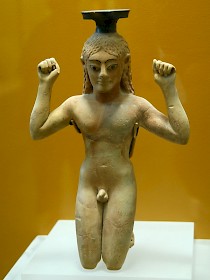Pisistratus - Livius (original) (raw)
This page is a stub. It will be expanded to a full-fledged article.
Pisistratus (Greek: Πεισίστρατος) tyrant of Athens, died 528/7 BCE.
Perfume bottle in the form of a kneeling athlete: evidence for increased wealth in Pisistratid Athens
Although Solon had given new laws to the city (594/593 BCE), factional strife was destabilizing Athens. In 546, the citizens accepted Pisistratus as tyrant because he promised to restore law and order. Earlier, he had successfully fought against Megara, even capturing its port Nisaea.note[Herodotus, Histories 1.59.]
His tyranny, which lasted from c.546 until his death in 528/527, was the first period of Athenian glory. He broke the power of the old aristocracy, the Eupatrids, strengthened the institutions of the city, improved the economy, built temples, organized religious festivals, and stimulated cultural life. He also ordered the conquest of the Chersonese,note[Herodotus, Histories 6.35.] purified Delos,note[Herodotus, Histories 1.64.] and conquered Naxos and Sigeum.note[Herodotus, Histories 1.64 and 5.94.]
There are many stories about his tyranny. At least one of them is suspect: when we read that Pisistratus twice attempted a coup d’état and succeeded the third time, we must recognize that “third time lucky” is a standard motif in oral literature. Of course Pisistratus’ tyranny is a historical fact, but the story of his accession is suspicious and cannot immediately be accepted as true.
Pisistratus was succeeded by his son Hippias, whose reign was resented by many people. The word "tyrant", which originally just meant "sole ruler", received its current meaning, "despot".
